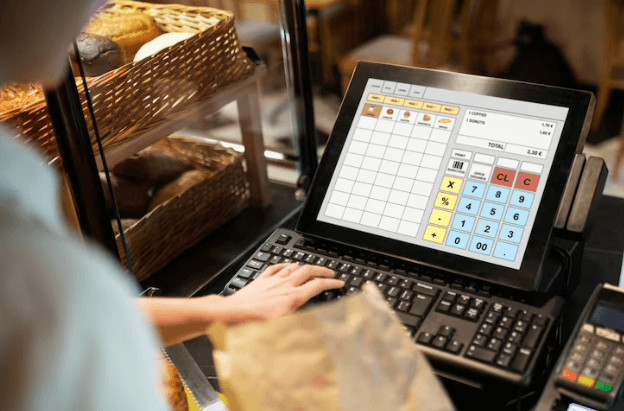Retail Management Systems 101: A Quick and Easy Guide

As a business or store owner, you understand all too well the monumental effort and planning that must be devoted to guaranteeing your success.
From stocking shelves to managing employees and keeping track of inventory levels, there are so many moving pieces in the retail puzzle.
Having a reliable retail management system (RMS) can be an essential piece that helps streamline operations while making life easier for both you and your staff.
Whether you’re just beginning to explore the possibilities of a retail management system or are already an expert in everything from inventory and POS functions to customer loyalty programs and financial reporting, this is your ultimate guide, covering everything you need to know.
Retail Management System Overview
If you’re still running your retail business manually, it’s time to shake things up. A retail management system can revolutionize your operations by automating administrative tasks like customer engagement, sales tracking, and inventory control.
Having a retail management system in place can drastically enhance your business operations, eradicate manual errors, and give you profound insights into your company’s performance.
It will also help expedite processes and increase profits while providing customers with remarkable experiences.
Investing in the right apparel management software can be a game-changer for apparel retailers.
With this tool, retailers can easily manage their products, customers, and orders while gaining insights into customer preferences and buying habits.
Essential Features of a Retail Management System
As the retail industry is highly competitive, selecting the correct retail management system can make or break your success.
With such an array of choices available, it’s essential to comprehend what qualities are most critical for you to consider.
Efficiency and intuitiveness should be the primary traits of any retail management system. It must also handle inventory monitoring, sales tracking, customer data entry, etc., while simultaneously providing real-time analytics.
Moreover, this empowers you to make wise decisions for your business operations. Moreover, scalability and customizability are essential features since every business possesses its own unique requirements.
By choosing a system with these features, you can streamline operations and increase productivity, ultimately leading to higher profits.
Retail Management Systems: The Pros
A retail management system can help a retail store to run effectively. It combines different roles like inventory management and point of sales, which ensures better performance. In this section, we will be discussing the benefits of using RMS. Read on…
Managing Inventory
The retail management system basically combines various tools and provides accurate inventory information. This helps them to make recommendations for improved customer experience and increased revenue.
Streamlining The Inventory Management
Secondly, RMS includes automation and real-time data that help streamline task management in this way. It becomes easy to manage complicated business processes.
Centralizing All The Reports And Dashboards
RMS or retail management systems provide accurate and custom reports. These reports are useful for multi-store retailers. The reports help them to understand all the location-based requirements, whether it is about supply or demand.
Customizing Documents
Thirdly, RMS makes it easy for you to customize all the documents, such as invoices, despatch notes, and labels. These can further help you to improve your brand image and customer relations.
Better Customer Service
Lastly, a good RMS always helps to move sales transactions faster. It also adds more efficiency to the process. As a result, it becomes easy for you to satisfy customers.
Retail Management Systems: The Cons
Let me share with you some of the disadvantages of operating retail management systems. There are specific needs which are fulfilled by RMS but there are also some shortcomings!
Invoicing
There are times when the Retail Management Systems can be ineffective, especially when the process of invoicing might not be efficient. At times, the invoices are not issued for all products that are sold.
Unsatisfied Customers
At times, Retail Management Systems might not always be profitable. This is especially because there might be issues with customer service. Therefore, it is important to give effective customer service.
Loss of Inventory
You might also experience issues with tracking stock levels as there can be loss of inventory. So, the Retail Management Systems might integrate a loss of inventory especially when tracking stock.
Sales Reporting and Analytics
It is a delicate aspect when discussing sales reporting and analytics when discussing Retail Management Systems. You will need several tools which might help you in inventory management but ultimately, sales reporting might impact the RMS.
Tips for Getting the Most Out of Your Retail Management System
As a retail manager, you recognize the importance of having an effective management solution in place to optimize your operations and boost profits.
Are you squeezing every ounce of value out of it? Here are some expert pointers to make sure that’s happening.
To remain organized and productive, it is essential to review your data regularly for accuracy. Furthermore, leverage technologies such as automated reporting and inventory management tools that will save you valuable time and energy.
Additionally, employees should be kept informed of the system through regular training so they can utilize its full potential. Follow these steps consistently if you want to be a retail success.
Retail Management Systems: How It Is Going To Shape The Future Retail
Thanks to the rapid progress of technology, retail management systems are evolving into increasingly automated and digitalized operations.
As eCommerce quickly becomes an integral part of our daily lives, retailers must be prepared to transform their strategies and proliferate.
Current estimates suggest that by 2026, eCommerce sales will reach about $8.1 trillion. Manual inventory tracking and laborious manual point-of-sale systems are a thing of the past.
However, now, it’s all about modern retail management systems that help streamline processes while simultaneously increasing profits.
With the addition of artificial intelligence and predictive analytics, retailers can now forecast consumer demands and adjust their inventory accordingly.
Finally, the future of retail management systems is overflowing with potential and exciting chances for customized, personalized experiences.
Some of the possible trends include:
Omni-channel retailing
Through the retail management systems, retailers can offer a consistent shopping experience across all channels. It can be done through mobile applications, physical stores, or online.
Direct-to-consumer relationships
The suppliers will be able to establish a direct relationship with the customers. They won’t need to rely on the middleman like the retailers.
Smaller and more focused stores
The physical stores will be smaller in size. The stores will be more focused and highly integrated with digital elements.
Retail Management Systems: The Final Verdict
As we approach the end of this discussion, selecting the ideal retail management system for your company can be a daunting task. However, if done correctly, it can significantly enhance operations and boost profitability.
Investing in a sound system that has robust features and is tailored to meet the needs of your business will be a worthwhile expenditure.
With careful research and thoughtful hardware selection, setting up a powerful and efficient retail management system is possible.
By following the tips mentioned in this guide, you can create an optimized workflow that will help reduce costs while achieving tremendous overall success.
Additional:


























Leave A Reply